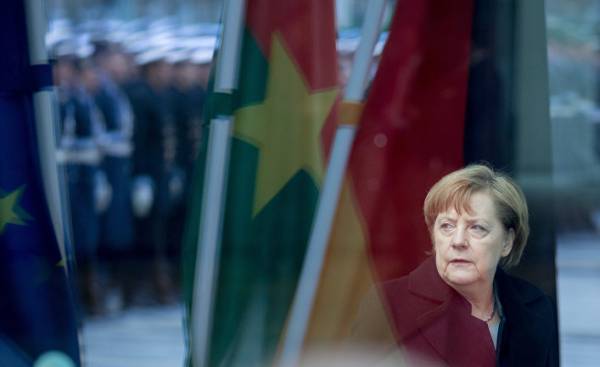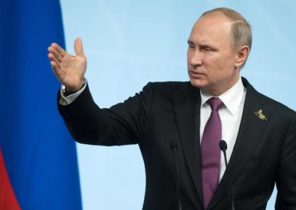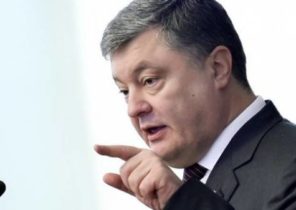
Despite his clumsy words and a limited intellect, at times Donald trump says the right things. For example, when he says that Germany is “very bad for trade”. How would Berlin nor asserted its own innocence and noble intentions, the fact remains that the Euro significantly improves the position of German exporters in comparison with residents of other Europe and abroad. There is nothing surprising in the fact that the balance between imports and exports shifted from equilibrium during the creation of the Euro by a huge margin in favor of exports, at the moment of at least eight percent of the German national economy — whereas all the other major EU economy mired in deficit. No sincere observer can deny that the economic structure in Europe is skewed — this is especially true of Germany, which Berlin does not seem to notice.
The Euro was supposed to support all the new members of the Union. When it was introduced at the very end of the last century, the EU demonstrated to the world the reports and reviews that listed the General benefits of a joint currency. They argued that as a single political entity with a single currency, Europe will be able to stand on equal terms with such powerful economies as the U.S., Japanese, and Chinese. In addition, thanks to the Euro among the countries of the Union will be evenly distributed emission benefits. As the business keeps their savings in the currency, printing her country is getting real goods in exchange for existing sellers paper. However, since businesses prefer to hoard the currency of the countries with more powerful and strong economy, these countries benefit the most. As argued by the creators, will give the Euro it is an advantage to the Union as a whole, not just its wealthiest members.
According to the EU, from trade gained momentum thanks to the increased stability of the currency, was supposed to win it all. With a decreased risk of falling currencies had to fall and lending rates, giving smaller and poorer members access to cheap credit and encouraging large investments and economic development. Larger trade also would have deepened economic ties, giving the citizens of the Union countries access to more diverse goods and services, and making a single European economy more robust in the face of economic cycles, regardless of whether they were born in Europe or beyond.
On paper it looked great, but in reality everything turned out differently. Instead, to ensure that all countries participating in significant benefits, it turned out that the single currency entrenched distorted and inadequate prices in the national currency. It all started with enthusiasm in anticipation of the monetary Union. The high expectations placed on countries such as Greece, Spain, Portugal and, to a lesser extent, Italy, have increased the value of their national currencies. Over time, the reality would have returned excessive prices to the quantities due to the fundamental strengths and weaknesses of these economies. However, the Euro froze them, turning a temporary problem into a permanent one. Meanwhile, Germany still suffered from its Association caused by economic difficulties, entered the monetary Union with the weak Deutschmark — if you believe the IMF, to match the German economy lacked six percent.
Thus, from the beginning of monetary Union the Eurozone has divided into two types of economies. Greece, Spain, Portugal, Italy and the like have turned into consumers. Since the Euro has consolidated their overvalued currency, the population of these countries with a sense of greater purchasing power than allow their economies — consumption increases in proportion to this sensation. At the same time, an overvalued currency has put producers in these countries at a disadvantage. Germany, where he was assigned cheap currency, was in the opposite situation. It became the main European producer, while German consumers feel poorer than he really was, and therefore were careful. Since in such circumstances, Germany was motivated to increase production — in contrast to other countries where such a motive was not — the Germans carried out more productive investments, strengthened its economy and deepened the gap between economic reality and its presentation in Euro. According to the updated IMF, by 2016 the gap of Germany in relative prices doubled to 12%.
This imbalance in prices has caused even more damage. The German economy is increasingly focused on exports, the less satisfied their consumers, became increasingly more dependent on events outside the country, and therefore more vulnerable. This distortion was released outside of Europe. Reinforcing the fiscal and financial problems of many Eurozone members, they led to the fall of the Euro against the dollar, the yuan and other currencies. Accordingly, the benefits received by German industry due to the low cost of the currency spread to the global market, has changed the situation compared to the hypothetical situation where Germany would be an independent currency, to avoid the impact of the weak European economies. Japanese manufacturers are incessantly complaining about how the strong yen has led to unfavorable prices for their products on the world market. American manufacturers, faced with the decline of the Euro against the dollar by 30% in 10 years, hardly are in the best position. German industry, on the contrary, no complaints there.
Berlin and German press, and reject any attempt to lay responsibility on Germany. They hotly deny that Germany had deliberately set this way. It is possible that they are right. At the birth of the Euro, no one expected such a result, even the Germans themselves. However, whether it was intended or not, is absolutely clear that Berlin used the resulting benefits and have taken steps to keep them. For example, Germany has risked all 671 billion euros ($752 billion), a quarter of its gross national income to support Greece and other countries with weak economies on the outskirts of Europe. In addition, she helped to convince the IMF to give them loans. Berlin argues that the willingness to risk all that money evidence of its loyalty to the European experiment, which is a single currency. Maybe so, but in this case it’s just incredible dedication. Prone to cynicism observer might assume that such bold action has a different motivation, and that Germany desperately seeks to prevent the collapse of the structure, which is so beneficial to German industry.
Whatever the motives of the Germans, it is clear that trump’s words are not without truth. Germany enjoys an unfair competitive advantage. All but German Industrialists are interested in correcting this distortion of the currency value. How Europe can do it, is unclear. Coordination of policies of taxes and spending can mitigate some of the difficulties generated by distorted prices, however this will not eliminate the root of the problem. A good first step would be the recognition of the existence of such distortions and the potential benefits from correcting them. This will encourage consumers in Germany to show restraint, prodemonstriroval that their global purchasing power less than it seems. For German consumers, the effect will be counterproductive. Correcting imbalances will help producers in other countries and facilitate fiscal and financial crisis, which remains Europe for almost a decade. In addition, it will save German taxpayers from having to risk that kind of money to support that caused this skewed system. Even if such changes would hurt German industry, they will slow down and even turn the harmful impact that bias has on the German economy.
Milton Ezrati — contributing editor of the National Interest, the Center for research on the human capital of the University at Buffalo recent and Vested as of the chief economist. His latest book, “Thirty tomorrows” (Thirty Tomorrows), recently was published by Thomas Dunne Books, an imprint Saint Martin’s Press.







